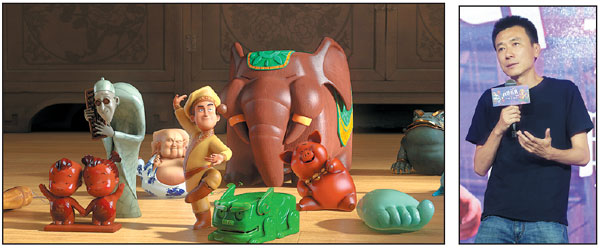Animated film on 'tea pets' set to hit mainland screens
By Xu Fan (China Daily) Updated: 2017-07-20 07:22During a visit to Paris a few years ago, Gary Wang saw some "tea pets" - porcelain figures usually placed on tea trays - displayed in an antique shop there. It reminded Wang of his early years in Fuzhou, East China's Fujian province, where one of local pastimes was to drink tea and "raise" such pets.
The figurines, a part of China's tea culture - usually in the form of animals or ancient Chinese - need to have tea poured over them. And the longer this process continues, the more valuable they become.
"I could not stop thinking about what would happen if those little statues came alive," he says during an event in Beijing.
Wang has turned his thoughts into a 3-D animated movie, Tea Pets, his second directorial feature produced by the Beijing-based studio Light Chaser Animation.
|
Gary Wang's (right) second directorial feature, Tea Pets, is a 3-D animated movie about a group of tiny statues that come to life. Photos Provided to China Daily |
The movie will open in Chinese mainland theaters on Friday.
The film, which was screened at the 2017 Annecy International Animated Film Festival in France earlier this year, is now seeking international distributors for an overseas version. But producer Yu Zhou did not reveal the details.
Meanwhile, the studio's first animated feature, Little Door Gods, also rooted in Chinese culture and myths, has an English version done by Hollywood stars such as Meryl Streep and Nicole Kidman.
As for Tea Pets, the film set in a picturesque city in China is about a group of tiny statues in a tea shop that come to life when left alone.
There, A Tang, the protagonist figure, teams up with a robot to embark on an adventure with the hope of changing their destiny.
More than 160 animators worked for around five years on the Tea Pets project.
Some of them even visited Dehua county in Fujian province and Yixing city in Jiangsu province - two places known for pottery - to learn about "tea pets".
Speaking about the challenges they faced, Yu says: "The most difficult part was to make the 'pets' look like ceramics and then bring them to life. We worked for nine months to develop a new software to create this special effect."
Despite the buzz created by Tea Pets, most domestic animated titles have been overshadowed by Hollywood or Japanese hits since the late 1990s.
Speaking about this phenomenon, Yu says that most domestic titles are aimed at young audiences.
He believes Tea Pets is a good way to draw adults to watch such films.
Wang says Chinese animated works were once loved by locals, specially in the 1960s and 1970s.
"They were typical Chinese tales," says Wang, adding that Chinese animators should focus more on producing quality works with Chinese roots.
He says that Tea Pets cost 85 million yuan ($6.76 million), merely one-tenth of what a Disney title with similar computer-generated imagery would need.
Also, to better polish the storytelling, Tea Pets held test screenings and adjusted the content based on audience feedback.
Wang, who is the founder of China's first video-sharing site Tudou, says animation gives him more freedom to build a dream world.
His next feature-length movie is called Mao Yu Taohuayuan (Cats and Paradise).
It's about a cat and his son living in a city.
- 'Cooperation is complementary'
- Worldwide manhunt nets 50th fugitive
- China-Japan meet seeks cooperation
- Agency ensuring natural gas supply
- Global manhunt sees China catch its 50th fugitive
- Call for 'Red Boat Spirit' a noble goal, official says
- China 'open to world' of foreign talent
- Free trade studies agreed on as Li meets with Canadian PM Trudeau
- Emojis on austerity rules from top anti-graft authority go viral
- Xi: All aboard internet express












